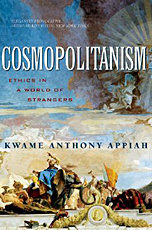In a time when intellectuals emphasize the clash of civilizations and the separations among peoples, citizens, races, and believers; Kwame Anthony Appiah , Laurence S. Rockefeller University Professor of Philosophy and the Center for Human Values at Princeton University, puts forth the proposition that we are all citizens of the world and "everybody matters." The author, who was born in Ghana, educated in England, and is now a professor at a prestigious university, traces the essentials of cosmopolitanism back to the cynics of Greece in the fourth century B.C. who acknowledged that people can be a member of one world and many worlds at the same time. Appiah considers the Victorian explorer and literary genius Sir Richard Burton an early pioneer of cosmopolitanism.
In a 1788 essay in his journal, Christoph Martin Wieland — once called the German Voltaire — expressed the ideal: "Cosmopolitans . . . regard all the peoples of the earth as so many branches of a single family, and the universe as a state, of which they, with innumerable other rational beings, are citizens, promoting together under the general laws of nature the perfection of the whole, while each in his own fashion is busy with his own well-being." Yet ancient habits exist, and many still insist on dividing the world between "us" and "them." Fundamentalism emphasizes exclusion, and another approach rejects universality altogether and says, "Not everybody matters." These two counter-cosmopolitan philosophies are not running out of steam in the twenty-first century.
Appiah salutes the idea behind the Golden Rule: "that we should take other people's interests seriously, take them into account. It suggests that we learn about other people's situations, and then use our imaginations to walk a while in their moccasins. These are aims we cosmopolitans endorse. It's just that we can't claim that the way is easy." Cosmopolitanism by Kwame Anthony Appiah makes a good case for both difference and universality. It is a solid entry in a new series of books from W. W. Norton edited by Henry Louis Gates, Jr., on "Issues of Our Times."
